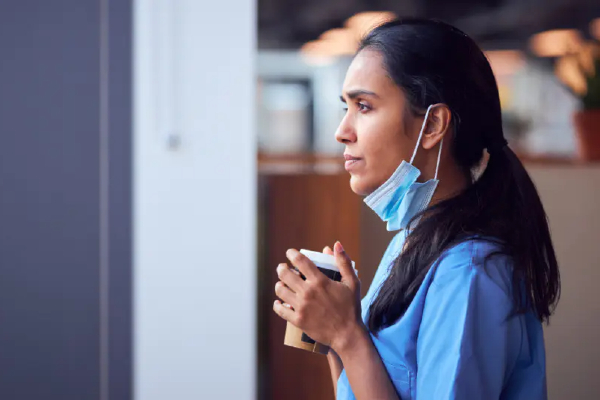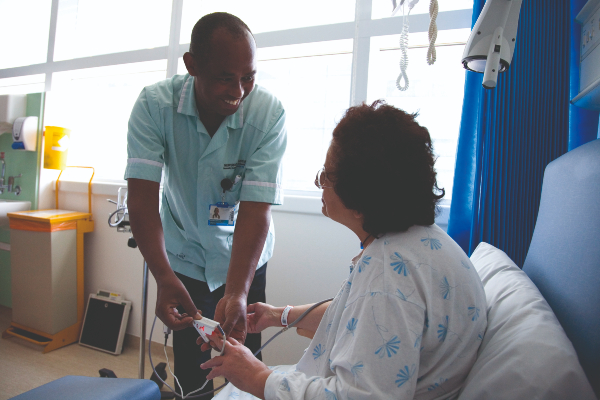
Long COVID: RCN demands action from UK government
We’ve written to the Department for Work and Pensions to insist long COVID is classed as an occupational disease for health care workers, which could mean they get more financial support.
The RCN recommends using an updated browser such as Microsoft Edge or Google Chrome

Support for nursing staff, managers and reps
On this page, we share guidance and advice for our members living with the condition and those who support them.

Use our advice guide to help you navigate living with long COVID. It’s relevant to all nursing staff, wherever you work.

Our reps toolkit shares specific guidance for members who represent nursing staff with long COVID.

Read our guide for managers to help you support staff with long COVID in your workplace.

Our long COVID peer support group provides a platform for members to give and receive non-professional support.
The Industrial Injuries Disablement Benefit (IIDB) scheme provides a no-fault, tax-free benefit for any employee who suffers a personal injury caused by a work-related accident.
It also covers those who contract a prescribed industrial disease or injury while working.

The NHS Staff Council Equality, Diversity & Inclusion Group (EDIG) has published guidance on supporting staff with a disability.
NHS Employers and EDIG would be grateful if you would share this with your teams and networks, including our reps.

Ngaire Cox is an RCN steward and has supported a number of members to successfully return to work while managing their Long COVID symptoms.
There are two cases that stand out. Both caught COVID during the early part of the pandemic when nobody understood the possible long-term health issues and how to treat them. Many would try to return to work, but relapse, or find that they didn’t have the stamina to carry out their normal duties.
One of our members, desperate to regain her health and get back to work, contacted me early for advice around the sickness absence processes. She was pursuing private, fairly experimental, treatment outside of the UK. She had contacted me early and so, as well as giving her advice and signposting her to the right services and resources, I made sure I was at all the review meetings and available as a point of contact.
I was able to advocate for her but was very aware that she was the expert in her condition and her lived experience should ultimately guide us. It was also important to make sure that the treatment and advice she was getting from the clinic was acknowledged as credible and taken into account. When she was able to return to work, we negotiated reducing her hours and put some reasonable adjustments in place to help her manage her fatigue.
In the other case, the member had a very physically demanding role - driving from patient to patient – and that made a return to that job impossible. We were able to find her a different role that was more sedentary and in a fixed location. The challenge with that case, was that I came to it very late in the day. They had already been off sick for a very long time, and it had reached a crisis point with the employer considering terminating their contract.
Members often feel that they can manage things on their own, but employers can be very quick to progress sickness absence processes. If a rep is at meetings, they will have the confidence and the objectivity to say: ‘Bear with us. Be patient. We think this can work itself out. This person has significant nursing knowledge and experience, please don’t be so quick to let them go.’
Support and adjustments can be put in place to help make sure that a return to work - from any long illness - can be successful. It is also worth contacting your local NHS Long COVID assessment centres as their recommendations can be vital in securing reasonable adjustments.
As a rep I know what I can do, but I also want to keep working in partnership with employers to make sure that line managers have the guidance and the key skills to help them to play their part.
Lesley Cunningham is a full-time RCN steward. She has been supporting a member, following a diagnosis of long COVID.
For a while I’d been supporting one of our members who had a range of different physical health issues, helping her to stay at work in a health surveillance role, with a hybrid model involving some working from home.
During the pandemic, although she should have been shielding at home, unfortunately she was required to attend her workplace, rather than working remotely. As she didn’t drive, this also involved taking public transport, potentially increasing the risks of contracting COVID – which is what happened. But she recovered and came back to work.
Sadly she became unwell again, at which point her GP diagnosed her with long COVID. It’s been quite devastating for her and she’s been unable to return work since 2020. Healthwise, it’s been hugely debilitating, impacting her respiratory, cardiology and neurology functions, alongside her existing chronic conditions. Financially, although initially she was on full pay, then a period of half pay, since last autumn she hasn’t received any salary.
However, she’s now been deemed unfit to work and we think she is the first person in the UK to retire early through ill health, caused by COVID. As her RCN steward, I’ve supported her throughout the process, involving outside agencies as necessary so we could ensure we’re doing the right thing for her.
Although I feel she still has a lot to contribute, it soon became clear that seeking alternative employment just wasn’t an option, as she can only function for about an hour-and-a-half without having to have several hours of rest, because she’s exhausted.
I’ve supported three members now who have long COVID, managing to secure alternative roles for two. It’s a very individual condition and needs tailor-made solutions designed around each person. Our knowledge of the long-term effects of COVID is growing all the time, but it’s still at the very early stages of research and we don’t understand enough yet about how it affects people and who might be at greater risk.
For our member, this is a great result as it’s removed so many anxieties about the future, giving her much more financial stability. At one point, she thought she might have to leave her home as she couldn’t afford to stay there. Receiving a regular pension will make such a difference to her quality of life and is a big relief.
She is someone who has given a lot to the NHS in Scotland, who is a nurse through and through, so I’m delighted that we’ve been able to help her achieve this outcome that will support her during the next stage of her life.

We’ve written to the Department for Work and Pensions to insist long COVID is classed as an occupational disease for health care workers, which could mean they get more financial support.

We’re asking for long COVID to be recognised in disability law and for health care workers with ongoing health issues to be properly compensated.

Nurses take their fight for key workers to Downing Street

From navigating disability benefits to finding peer support, the RCN is here to help you

The charity that nurse João founded helps bring hope to people in South Asia
{{ article.Summary }}